The parasympathetic nervous system
The parasympathetic system is responsible for the stimulation of the "rest-and-digest" or "feed and breed” activities that occur when the body is at rest, especially after eating, including salivation, lacrimation (tears), urination, digestion and defecation.In the case of defecation, the vagus nerve is responsible for carrying the impulse of the parasympathetic nerve from the central nervous system to the colon. When there is a problem that affects this nerve, the process of defecation may be affected. Such a problem could be a mismatch in the C1 vertebra. In this case, an osteopathic treatment may be the solution.
.jpg) The parasympathetic nervous system uses chiefly acetylcholine (ACh) as its neurotransmitter, although peptides (such as cholecystokinin) can be used. As explained in this other article when broken down into peptides, gluten and casein release opioids, opium-like substances called "exorphins". Those exorphins can be partially released in the gastrointestinal tract by the action of our enzymes. Opioids, exorphins as well as opioid drugs (like codeine) carry the slowing down of the activity of the colon as a side effect, which can lead to serious constipation.
The parasympathetic nervous system uses chiefly acetylcholine (ACh) as its neurotransmitter, although peptides (such as cholecystokinin) can be used. As explained in this other article when broken down into peptides, gluten and casein release opioids, opium-like substances called "exorphins". Those exorphins can be partially released in the gastrointestinal tract by the action of our enzymes. Opioids, exorphins as well as opioid drugs (like codeine) carry the slowing down of the activity of the colon as a side effect, which can lead to serious constipation. Hypothyroidism
One of the symptoms of hypothyroidism is constipation. When there is an insufficient amount of the thyroid hormone, many of the functions of the body decrease in activity. Hypothyroidism may weaken the contraction of the colon muscles which move the feces along the bowel.There are many theories about the causes of hypothyroidism, one of which is autoimmunity caused by an immune system attack crossover between thyroid cells and certain foods or certain bacteria, due to their possible protein similarity. Another theory claims that the toxic environment and toxins produced in the gut are responsible for the malfunction of the thyroid.
Lack of bile
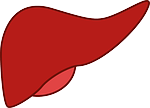 According to Dr. Campbell-McBride (1), when there is not enough bile excreted by the liver, the fats do not get digested properly; instead they combine with salts and turn into ´soap´ in the intestine, binding food together and making the person constipated. The most common reason for poor bile production is gallstones.
According to Dr. Campbell-McBride (1), when there is not enough bile excreted by the liver, the fats do not get digested properly; instead they combine with salts and turn into ´soap´ in the intestine, binding food together and making the person constipated. The most common reason for poor bile production is gallstones.Bile stones are there form all of our lives, and in the initial states they are small and soft and pass easily through the bile ducts into the duodenum every time we eat fats. Once in the duodenum, the stones go all away to the bowel and get eliminated in stool.
In some people, due to abnormal gut flora and poor stomach acid production, the liver does not get enough stimulation to empty the bile into the duodenum, so the bile stones stay in the bile ducts too long and become calcified. As the stones accumulate calcium salts on their surface, they get larger and their surface becomes hard and rough, so they cannot be easily passed through the bile ducts.
Hard stones can lead to attacks of abdominal pain, but soft ones usually don't cause any pain while disturbing the passage of bile and they are not possible to detect in the X-rays.
In order to do a liver cleansing, there are different treatments. Dr. Campbell-McBride (1) suggests having her “GAPS Milkshake” regularly, a drink made of a mixture of vegetable and fruit juice, raw eggs and homemade sour cream (or coconut oil).
Other important treatments for liver detox are Andreas Moritz’s liver and gallbladder flush (3) and Dr. Clark’s liver cleanse. These treatments can be followed starting at the age of 4 if necessary, but it is best to wait until the age of 10 due to the discomfort produced during the cleansing.
Andreas Moritz says that the cause of constipation is the lack of bile itself, because bile serves as the body’s natural laxative. Constipation and sluggish bowel movements are the most common consequences of impeded bile secretion. In general, good fats may help against constipation. They lubricate our gastrointestinal tract to some extent, and make us secrete more bile, which is a natural laxative.
Intestinal dysbiosis: the lack of beneficial bacteria
According to Dr. Campbell-McBride (1), constipation is often a sign of deficient gut flora.The beneficial bacteria play a crucial role in proper stool formation and elimination, particularly Bifidobacteria and physiological beneficial strains of E.coli. These microbes produce a whole host of enzymes and other active substances whose action stimulate the wall of the bowel to produce mucus for lubricating the stool and for passing it out.
It will be necessary to restore intestinal flora with a nutritional treatment based primarily on avoiding intolerant and/or unhealthy food, ingesting many foods that are rich in these families of beneficial bacteria and possibly some probiotics as well. The role of probiotics will be explained below in more detail.
Intestinal dysbiosis: Candida and other bacteria
Some yeasts such as Candida albicans, and many other opportunistic bacteria in the intestine forms a biofilm. A biofilm is a protective sticky substance that adheres to the intestinal wall in which microbial populations exist and are able to hide from the immune system and antimicrobials. This biofilm is impermeable to antifungals, antibodies and white blood cells.There are a lot of natural remedies to fight candidiasis: essential oils of oregano, olive oil, herbs like psyllium and pau d'arco, some beneficial organisms such as Saccharomyces boulardii as well as probiotics. But the most important part is to avoid eating foods that feed yeast in the body, mainly carbohydrates and sugars that are not digested by the body, such as, for example, lactose.
It is empirically established by naturopaths that some foods such as cereals containing gluten and dairy products produce mucus in the intestine which usually spreads to other parts of the body, such as to the respiratory tract. Dr. Mouton (4) also supports this same opinion that has been held by numerous naturopaths for a long time.
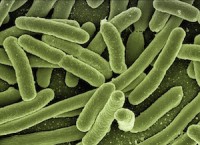 In general, any undesirable bacterial overgrowth produces a sticky mucus in the intestine, which prevents the passage of stool in the bowel.
In general, any undesirable bacterial overgrowth produces a sticky mucus in the intestine, which prevents the passage of stool in the bowel.Opportunistic strains of E. coli involve enhanced mucus production that encases the bacteria forming a biofilm, Clostridrium produces acute inflammation with pus and mucus formation results in pseudomembrane formation.
The uncontrolled development of these opportunistic bacteria in the gut is caused by several factors. However, we can indicate antibiotics as the main cause.
It’s possible to evaluate the state of your gut flora with a microbiological stool test and urinary organic metabolites.
Parasites
Some parasitic worms are actually large enough to physically block the passage of nutrients and waste at certain points in the digestive system. Severe parasitic infections in the bile duct or the intestines can make bowel movements difficult, leading to worsened symptoms of constipation.Food intolerances
In those people sensitive to some food proteins, fragments of proteins travel undigested to the intestine, and gets absorbed into the blood because of the leaky gut syndrome. Those foreign fragments trigger an inflammatory response, a swelling of the intestinal lining, which leads to constipation (possibly through partial obstruction due to the swelling).A test of food intolerances can help to figure out if you suffer of these intolerances.
Psychological
 Make sure that you do not make your child feel stressed or pressured about using the toilet. It is also important to let your children try things by themselves (when appropriate). Constantly intervening when they are using the toilet may make them feel anxious and may contribute to constipation.
Make sure that you do not make your child feel stressed or pressured about using the toilet. It is also important to let your children try things by themselves (when appropriate). Constantly intervening when they are using the toilet may make them feel anxious and may contribute to constipation.Some children can feel stressed or anxious about using the toilet. They may have a phobia about using the toilet, or feel that they are unable to use the toilets at school. This fear or phobia may be the result of your child experiencing pain when passing stools. Some children and adults are so constipated that stools become hard and large, and the anus cracks and bleeds on the stool-passing. So the person becomes afraid of using the toilet. This can lead to poor bowel habits, where children ignore the urge to pass stools and instead withhold them because of fear of experiencing pain and discomfort. However, this will mean that their condition only worsens. It’s important to avoid reaching this point and to find a remedy on time, may it be just a temporary one.
Sedentarism, stress
Don't ignore the urge to have a bowel movement. Take your time in the bathroom, allowing yourself enough time to have a bowel movement without distractions and without feeling rushed.Exercise can help constipation. There seems to be a relationship between exercise levels and the incidence of constipation, and in cases of vigorous exercise (e.g., running) there is clearly evidence of a significant increase in activity. The use of physical exercise can be helpful for modest constipation, but it does not seem to be effective for severe cases.

Stress makes our body secrete adrenaline and, on the longer term, the stress hormone cortisol. Stress reroutes our vital resources (like blood) to the parts that need energy during a fight or flight situation. Because the digestive tract is not vital when we are trying to escape danger, blood is rerouted to the lungs, the heart, and the skeletal muscles. The gastrointestinal tract, colon included, will be put on the back-burner. Not good for constipation sufferers. And this is even worse when the stress situation becomes chronic.
Food
Fiber
As it was explained in this other article, it is commonly accepted that there are two different types of fibers: soluble and insoluble, depending on their capability of water solubility. Most of the soluble fibers attract water and form a gel which is fermented by gut bacteria. It also slows down the digestion of starch and prevents spikes in blood sugar, so avoids the hypoglycemia-hyperglycemia cycle due to the fluctuant level of insuline. Insoluble fibers don’t dissolve in water, most of them are not fermented and speed up the passage of food and waste thought the gut, helping prevent constipation.All plant foods contain both types of fiber in different degrees, but mainly starchy food such as pulses, some fruits and tubers contain a higher proportion of soluble fibers, while most of the cereals, vegetables, fruit and nuts contain more insoluble fibers, so they help fight against constipation.
High-fiber foods accelerate the pace of food residue in the intestine, while low-fiber foods slow down the pace and decrease the motility of the intestine, causing constipation.
According to the Natural Hygiene theory of T.C.Fry (2), constipation is caused by cooked food, animal products (meat, fish, eggs, diary) and food with excess of fiber (grains, tubers, legumes).
Natural Hygiene states that “For efficient and thorough digestion the body requires bulk in its food and nature has skillfully designed food for man which contains appropriate amounts of bulky cellulose fiber, that is vegetables and fruits, the amount incorporated in man's food apparently being proportioned exactly according to the design of the human alimentary canal and its ability to make use of it. Thus, it can be seen that persons who eat food not intended as food for man will do the body a disservice as will those persons who may eat suitable food but then alter, by application of heat, the fiber content of that food.
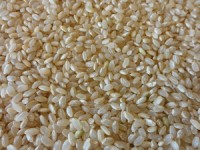 Some foods might contain too much fiber, more than the human body might be able to handle efficiently. Such foods should certainly be either completely avoided or, at least, restricted in the human food intake. They place too great a burden on the peristaltic and eliminative capabilities of the intestinal equipment. The cellulose in some foods can be abrasive to the mucosal lining and, long term, could lead to irritation and inflammation of the food canal. We refer to such foods as most roots, dried legumes and grains. These foods, especially if consumed uncooked, can be highly irritating as well as obstructive to free passage of the fecal residue, a condition which leads to packing of the canal with accumulating amounts of dried obstructive fiber, making the walls more or less rigid (the “piped” colon) and laying the groundwork for putrefaction and fermentation of contents. Obviously, too, the high cellulose content of the mentioned foods prevents complete digestion and interferes with absorption of nutrients that may be present in the foods.
Some foods might contain too much fiber, more than the human body might be able to handle efficiently. Such foods should certainly be either completely avoided or, at least, restricted in the human food intake. They place too great a burden on the peristaltic and eliminative capabilities of the intestinal equipment. The cellulose in some foods can be abrasive to the mucosal lining and, long term, could lead to irritation and inflammation of the food canal. We refer to such foods as most roots, dried legumes and grains. These foods, especially if consumed uncooked, can be highly irritating as well as obstructive to free passage of the fecal residue, a condition which leads to packing of the canal with accumulating amounts of dried obstructive fiber, making the walls more or less rigid (the “piped” colon) and laying the groundwork for putrefaction and fermentation of contents. Obviously, too, the high cellulose content of the mentioned foods prevents complete digestion and interferes with absorption of nutrients that may be present in the foods.When the foods that are best adapted to man's requirements are eaten, the fruits, the leafy green vegetables and a few nuts and edible seeds, and these are well masticated, we note that the digestive process extracts a maximum quantity of nutrients from the food and leaves most of the cellulose behind intact and this is then readily eliminated.
Every food intended for man has its required proportion of largely indigestible cellulose fiber. It is important that we consume our food in its natural state and not cooked, juiced or blended.”
Dr. Vetrano (2) further states that “such practices as cooking, blending or juicing affect the fiber content which is necessary for the proper movement of food through the digestive canal and for the stimulation of the secretion of normal digestive enzymes.”
Natural Hygiene states that “a low-fiber diet allows carcinogens to be concentrated and held in contact with the bowel mucosa for long periods, while a high residue diet (a vegetarian diet) produces more rapid passage of body waste.”
He says that “the length of man’s intestines is much longer than that of the carnivore’s. This is because meat and fish tend to putrefy rather quickly in the intestines and must be expelled quickly. Man’s lengthy intestinal tract cannot handle low-fiber foods such as meat quickly. Consequently, such foods decrease the motility of the intestines and fermentation results, along with eventual constipation.”
White flour based products should be on the list of foods that cause constipation because they have no fibers in them. But it is not clear that whole grains could avoid it.
Constipation condition is improved on a high-fiber diet. The combination of a high-fiber diet and increased fluid intake is the best option at avoiding occasional irregularity. Eating more fruits and vegetables is particularly efficient, because they are high in both fiber and fluids. But pulses, tubersand whole grains are not so high in water, so their role avoiding constipation is uncertain.
Toxemia
Natural Hygiene (2) believes that “The ingestion of any unwholesome food whether it is cooked, processed, or improperly combined will eventually result in systemic toxemia. This unwelcome state of illness affects the entire organism since the body reacts and functions as a whole. The body may be thought of as a unified structure working in harmony in order to maintain health. All bodily functions will be affected by the toxemic state and this includes the large intestine. Thus, constipation is a common result which we bring upon ourselves by eating cooked or otherwise denatured foods.However, when raw fruits and vegetables are eaten in the presence of true hunger, all bodily functions proceed unhampered and the digestive process also proceeds perfectly.
We must not think of one particular food to move our bowels or another food to improve our vision, etc. The proper food will provide the correct conditions for the human body to carry on all of its functions and health will be the natural result. When the entire organism is healthy, so will be the bowels and the body will eliminate all of the waste products of metabolism along with the food fiber.
We must keep in mind that it is not the fiber alone that ensures health of the digestive canal. It is a proper diet combined with all of the other aspects of a hygienic lifestyle which will result in health of the entire body and all of its functions, including digestion. By following all of the principles of Natural Hygiene, the body will be free from toxic overloads which result in constipation and other disorders.”
Excess of calcium
It is very typical that most calcium supplements often cause constipation, as well other gastrointestinal issues like bloating, gas and cramps, etc. These gastro issues happen because rock calcium carbonate essentially turns off the production of stomach acids. This is why rock is used as the main component in antacids. It works great if you suffer from acid reflux and heartburn, but your digestive system pays the price! If stomach acids aren’t there to churn and break down your food, then it makes sense that constipation, bloating, gas, and cramps will be the result.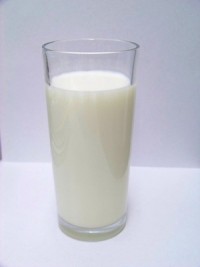 Natural Hygiene stands that “studies have shown that the calcium in pasteurized and processed milk products is poorly digested and absorbed and used by the body. Indeed, the calcium in such products may be used more to form “stones” or inorganic deposits in the body instead of being used to build strong bones. Nature provides the minerals and other nutrients we need in a perfectly balanced combination within foods. When we introduce large amounts of minerals, vitamins, etc. in a fragmented form, we throw the body out of balance.”
Natural Hygiene stands that “studies have shown that the calcium in pasteurized and processed milk products is poorly digested and absorbed and used by the body. Indeed, the calcium in such products may be used more to form “stones” or inorganic deposits in the body instead of being used to build strong bones. Nature provides the minerals and other nutrients we need in a perfectly balanced combination within foods. When we introduce large amounts of minerals, vitamins, etc. in a fragmented form, we throw the body out of balance.”Caffeine, chocolate and alcohol
Caffeine influences your digestive system in multiple ways. It is diuretic, it quickens the digestive process and it stimulates your colon. The effect of these mechanisms varies based on other physical factors; depending on your situation, caffeine can actually cause, relieve, worsen or prevent constipation. Some studies say that caffeine can make your colon absorb too much fluid too quickly. The colon’s overactive absorption of liquid also takes away the moisture needed to make your bowel movements soft, smooth and easy to pass. The dry, hardened stools that result from dehydration cause constipation. So, if you suffer from constipation and drink coffee, limit the dehydrating effect of caffeine in coffee by either drinking decaffeinated coffee or also drinking plenty of other beverages that do not contain caffeine.
Some studies say that caffeine can make your colon absorb too much fluid too quickly. The colon’s overactive absorption of liquid also takes away the moisture needed to make your bowel movements soft, smooth and easy to pass. The dry, hardened stools that result from dehydration cause constipation. So, if you suffer from constipation and drink coffee, limit the dehydrating effect of caffeine in coffee by either drinking decaffeinated coffee or also drinking plenty of other beverages that do not contain caffeine.On the other hand, other studies have demonstrated that if you regularly drink caffeinated beverages, the diuretic effects are almost negligible. In other words, if you drink coffee every day, your body retains the same amount of fluid from a cup of coffee as it does from a cup of water. If you don’t drink caffeinated beverages regularly, drinking a cup of coffee ends up being the equivalent of drinking about 2/3 of a cup of water. In other words, drinking coffee will hydrate you, just not quite as efficiently as water will.
Caffeinated drinks include coffee, black tea, caffeinated sodas (Coke, Pepsi, Dr. Pepper, Red Bull, etc), and green tea if you are very sensitive to caffeine or you drink a large amount of it.
In the other side, in some situations caffeine can actually relieve or prevent constipation. In addition to being diuretic, caffeine also triggers the contraction of your colon.
Like caffeine, alcohol can dehydrate you and cause constipation. Limiting your alcohol intake can help relieve constipation.
Chocolate does not have a clear profile as culprit. It does contain some tannins that are astringent. When in contact with our mucosa, they "shrink" the tissues and thus diminish our secretions. This leads to a drier gut, and therefore to constipation. But the effect of these tannins is very much less important compared to all the other food we have talked about before.
Medicine

Other medicine such as antidepressants, antiepileptics, antipsychotics, opiate painkillers such as codeine and morphine, diuretics and iron supplements, among others may include constipation as side effect. See the information leaflet of your medicine.Read the second part: "Constipation: Remedies"
References:
(1) “Gut and Psychology Syndrome”, Dr. Natasha Campbell-McBride
(2) “The Life Science Health System”, T.C. Fry
(3) “The Amazing Liver & Gallbladder Flush”, Andreas Moritz
(4) “Ecosystème intestinal & Santé optimale”, Dr. Georges Mouton
(5) “Safely Using Laxatives for Constipation”
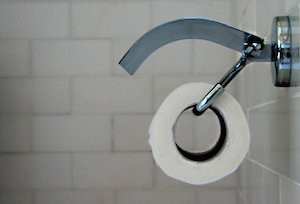 We speak of constipation when someone is unable to pass stool regularly. The frequency of the regularity depends on each person, but we generally consider it as constipation when someone feels the need to defecate but this person does not achieve to do so, due to a lack of intestinal motility.
We speak of constipation when someone is unable to pass stool regularly. The frequency of the regularity depends on each person, but we generally consider it as constipation when someone feels the need to defecate but this person does not achieve to do so, due to a lack of intestinal motility. 







 Gemma Calzada is a Holistic Nutritionist Ph.D. and a certified GAPS practitioner, accredited by ASCA. Her mission is to improve health through nutrition and to help people suffering from a dietary intolerance to live happily.
Gemma Calzada is a Holistic Nutritionist Ph.D. and a certified GAPS practitioner, accredited by ASCA. Her mission is to improve health through nutrition and to help people suffering from a dietary intolerance to live happily. 
